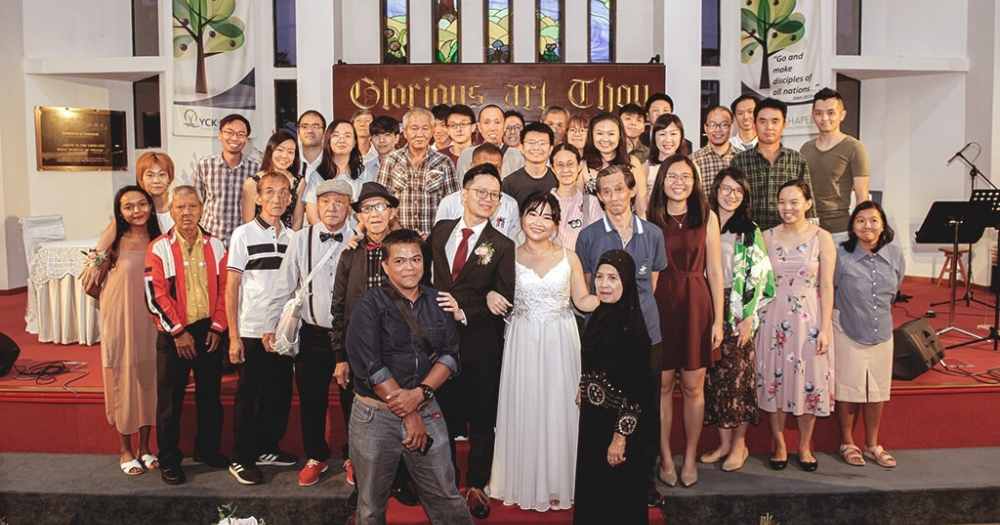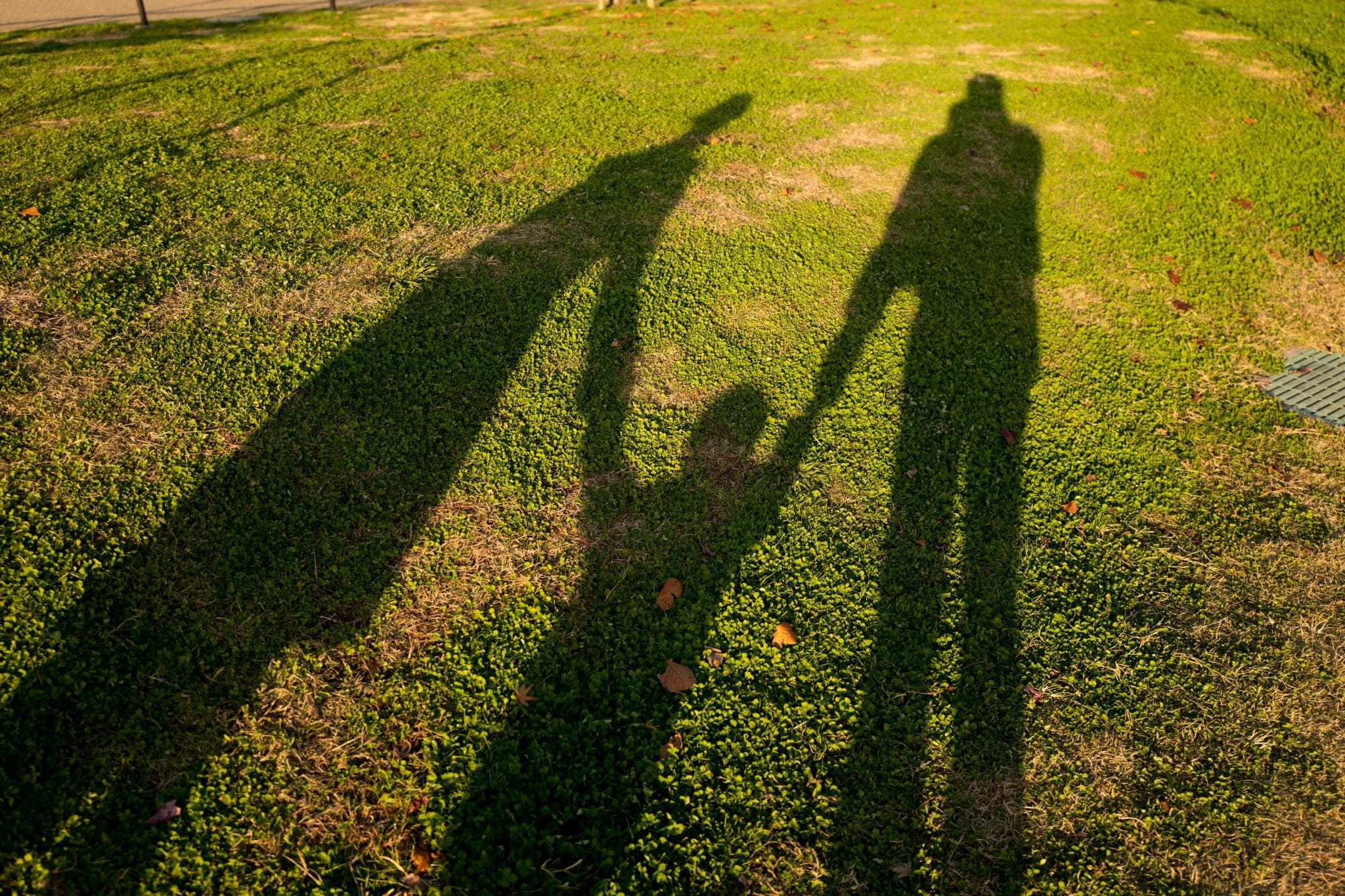Are we misreading “being in and not of the world”?
Rev Dr Babu Immanuel Venkataraman // January 11, 2021, 6:44 pm

Abraham Yeo and Peng Cheng Yu are advocates for the homeless. Here they are with some of the guests who attended their wedding — including their friends from Homeless Hearts. Photo courtesy of Abraham Yeo.
“Jesus says we’re to be in the world but not of it.”
Sadly, I have heard many well–meaning Christians citing this phrase as a rationale to be totally detached from the affairs of this age.
By doing so, this takes Jesus’ words out of context, for He also says that “My prayer is not that You take them out of this world” (John 17:15).
Jesus must have, therefore, meant not being literally out of the world, but something else.
First, let’s start by defining the term “world.”
While I have traveled to a few countries, I admit that I do not know what the world or life is like in many continents and countries. I can’t say I know anything at all about what life is like even in that small place or the major issues that the country is facing.
Therefore, I have chosen to limit this article’s points of reference (the “world”) to issues that affect humanity-at-large, including the human condition.
Story of our times
What are some of the challenges that humanity faces?
I list the following – not in any particular sequence – to illustrate the plethora of issues that confront humanity: Religion and state, child labour, water crisis and water–war, child sexual abuse, cyber warfare, deforestation, domestic violence, political violence, genocide, the global refugee crisis, globalisation, hate crimes, illegal immigration, illicit trafficking, modern homelessness, new slavery, climate change, rape, racism, religious persecution, right to die, women’s rights and gender issues, world political challenges, international arms trade, arms race, trade wars, poverty, proxy war and terrorism.
We cannot tell the story of God without reference to the dominant history and issues of our times.
On top of this, there are also things we all face at the “micro” level (individual, family) – social, economic, psychological, and emotional issues that are so varied and individual-specific that addressing all of them is virtually impossible.
All of these constitute the world as we have it — a world which we share and live in.
These issues are our issues; we are part of them and in every way, responsible for them collectively.
Given the intricate nature of our world, we have a responsibility to ask ourselves how we can be godly witnesses without becoming out of touch.
If we are the people of God, we cannot tell the story of God without reference to the dominant history and issue of our times.
Let me illustrate this by retelling the story of Moses, the Israelites in Egypt, and the Ten Commandments.
Accepting challenges as commission
The beginnings of the Israelites in Egypt had been quite auspicious.
Joseph had been appointed second to the Pharaoh and appointed “in charge of the whole land of Egypt” (Genesis 41:39–43). He had made sure his family settled down in Goshen, “the best of the land of Egypt” where they would “enjoy the fat of the land” (Genesis 45:18; 46:28–29).
Moses could have become indifferent to the plight of his own people. But this is where he stands out.
But when Joseph died, the fortunes of the Israelites turned. When Moses was born, nearly 400 years and 10 generations had come and gone. For them, Egypt was the land of slavery (Exodus 20:2) and it was highly possible that the Israelites were waiting for a hero or a messiah to deliver them.
Moses miraculously escapes being killed at birth, was rescued by the daughter of Pharaoh, and makes it to the palace (Exodus 1:16; 2:1–10).
He could have become indifferent to the plight of his own people, and thought to himself: “Thank goodness, I’ve made it to the top!”
But this is where Moses stands out as a class apart.
Exodus 2:11 puts it poignantly: “One day, after Moses had grown up, he went out to where his own people were and watched them at their hard labor.”
It is possible that this was not his first foray out of the palace, and that he had witnessed what has been happening for some time.
When we become aware of the various challenges around us, we are invited to accept the challenge as the commission.
“After killing an Egyptian who was beating one of his own, he was forced to flee to Midian but eventually returns when God commissions him to bring the Israelites out of Egypt.” (Exodus 2:11–15; 3:10; 4:18– 14:31).
As far as the Hebrews were concerned, the dominant history of their times was that of slavery. But one man decided that their past and present was not going to be their future – slavery was not going to be their final history. He was willing to respond to the challenge and make a difference.
In the same way, when we become aware of the various challenges around us, we are invited to accept the challenge as the commission.
Therefore, we must find a cause to be a part of, a cause worth fighting for, and if necessary, even lay down our lives.
The Ten Commandments, given through Moses, further explicates this point.
Brave new world
Is it possible to envision a brave new world and a brave new society?
The idea of One God (monotheism) in Exodus opens up that great possibility. Egypt had a pantheon of gods hierarchically arranged with Amun as the supreme god.
Known as henotheism, this hierarchical arrangement provided a pattern for hierarchically structuring society: Royalty, aristocrats, and the upper echelons were on top while the slaves (the vast majority of the population) were at the bottom.
In Exodus 20:2–3, God introduces Himself as the sole God (“I am the Lord your God, who brought you out of Egypt, out of the land of slavery. You shall have no other gods before Me”).
This One God cannot be hierarchically arranged. Therefore, logically, the Israelites, liberated by this One God, cannot arrange their society hierarchically.
The liberation from Egypt is not simply a political liberation, but also a liberation from the Egyptian mindset and model of society.
Whereas the Egyptian model of society thrives on a slave model, the new model thrives on equality, equity, and egalitarian ideals.
Welfare of society
As slaves, the Israelites were not entitled to job contracts, workplace safety, fair pay, insurance, or rest (Sabbath). But as a free people in their new world, they were to work differently.
After the exodus, the newly-freed Israelites were introduced the concept of honour through the 10 Commandments.
Anyone and everyone in this new free society — including non-Israelites and livestock — would have to abide by God’s work-and-rest mandate and ethics.
“…but the seventh day is a Sabbath to the Lord your God. On it you shall not do any work, neither you, nor your son or daughter, nor your male or female servant, nor your animals, nor any foreigner residing in your town.” (Exodus 20:10)
In a slave society, a slave is an expendable commodity. In a free society, everyone is a person with intrinsic value and a free society is built on everyone’s worth and contribution. Now, they had a responsibility to create jobs and formulate clearly defined labour laws.
In turn, every person has a responsibility for and obligation to contribute to the welfare of society.
Our witness
A slave society has no respect for a slave as a person.
But after the exodus, the newly–freed Israelites were introduced the concept of honour through the 10 Commandments.
- Honour your parents (Exodus 20:12) – Honour begins from home, no one is taken for granted.
- Honour life (verse 13) – All lives matter.
- Honour your wife and another woman’s body (verse 14) – No adultery.
- Honour what belongs to others (verse 15) – Stealing is prohibited.
- Honour the character and integrity of others (verse 16) — Do not bear false witness.
For the Israelites, their Promised Land was not just about inhabiting the land of Canaan. It was about constructing a new society in light of the 10 Commandments – the ideas and ideals for a “brave new world.”
As the people of God, we can – and we must – work to combat the issues of our times.
In the same way, each successive generation has a responsibility to reinterpret the ideas and ideals of the Ten Commandments and shape their world accordingly.
While the issues we face in this day and age are quite staggering, we are not to despair.
Instead, we must — while being fully aware of the truth about the world – envision a hopeful future.
Living out our ideals
What, then, can we do as the body of Christ to live out these ideas and ideals in our world?
1. Be intentionally present
Look around, observe, and dare to ask.
Why can’t the world be different and be better? Who am I in relation to my world or this specific issue that poses a threat to human sanity and dignity?
2. Be observant without becoming a spectator
This is not a new idea. Moses did it and so did our Lord Jesus. Jesus saw the poverty and bondage in His society and chose to locate His life and mission right in the midst of these issues – to proclaim the Good News (evangelion), freedom, and deliverance (Luke 4:18–19).
3. Listen more, talk and advise less
Dare to see beyond socioeconomic, religious, racial, and cultural differences by focusing on our common humanity. Demonstrate hospitality of listening to the other’s story without condemnation and judgment.
4. See a need, meet the need
Consider the example of Jesus and the early church to seek and meet needs. Despite the busyness of public ministry, Jesus was also mindful of individuals hidden in the crowd – those in need of someone to reach out to them.
All of us can make a difference. And the difference we make will be our witness.
- He heals a woman who had been bleeding for 12 years, restoring her to her farnily and community (Luke 8:42b–48).
- He heals a Samaritan leper and sends him back to his community (Luke 17:11–19),
- He visits Zacchaeus to announce salvation to his house (Luke 19:1–10).
- He travels to a remote Samaritan village to offer a nameless woman “living water” (John 4),
- He heals a man who had been invalid for 38 years (John 5:1–15).
Even when dying on the cross, He assures a repentant criminal of a place in paradise (Luke 23:42–43), The early church was also exhorted to consider the needs found within (e.g., the care of widows in 1 Timothy 5:16) and outside of the church (e.g., Acts 6:1–6; 9:36–41; James 1:27).
As the people of God, all of us can – and we must – work to combat the issues of our times.
The command and commandments have been given. Now it’s our turn to decide how we will be in and of the world we live in.
In the end, all of us can make a difference. And the difference we make will be our witness.
This article was first published in Issue 01/2020 of the Trinitarian. Copyright: Trinity Christian Centre. Reprinted with permission. Read more articles in the Trinitarian here.
READ MORE ABOUT ENGAGING AND TRANSFORMING THE WORLD:
Ps Andrew Khoo, founder of S’pore’s first homeless shelter, has given refuge to over 900
We are an independent, non-profit organisation that relies on the generosity of our readers, such as yourself, to continue serving the kingdom. Every dollar donated goes directly back into our editorial coverage.
Would you consider partnering with us in our kingdom work by supporting us financially, either as a one-off donation, or a recurring pledge?
Support Salt&Light




